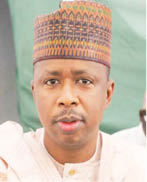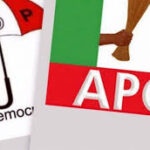Sirajo Aminu Makera, a chieftain of the opposition Peoples Democratic Party (PDP), contested the senatorial seat for Katsina Central during the last general elections. In this interview, the senatorial candidate who is contesting the outcome of the election at the tribunal speaks on some current national issues. Excerpt:
You are still challenging the outcome of that election at the tribunal, but now that the APC government is in charge of Katsina State, how would you rate the actions of their government so far even though they are less than a hundred days in office?
We are still waiting to see. You know the way it is in Nigeria; anytime there is a new government people tend to give them the benefit of the doubt to see where they are heading to. It is too early to say where the current governor of Katsina is heading to. There is no clear handover picture of what he met on the ground in terms of debt and how much money he met in government coffers. He has never even mentioned anything about the uncompleted projects or programmes he intends to continue with. So, the governor is yet to make a strong statement on how he intends to run the government but we will wait and see.
Katsina had always been a PDP state. How prepared are you in playing the role of opposition now that your party is no longer in charge of the state?
Let me say clearly that Katsina is a PDP state. The party had won elections for sixteen straight years and even this time around, we won many elections but were not able to protect our votes. However, we are forming a very formidable opposition in Katsina under the PDP. Usually in Nigeria, we have the ruling party and the main opposition and when the ruling party fails, the only place to go is the main opposition party. That is what happened in 2015, and that is what we were hoping would happen in 2023. Even though the case is still in court, we are very optimistic and the way the APC government is going, the PDP will bounce back in 2027, not only in Katsina State but Nigeria.
But your party appears to be going through a myriad of crises at the national and state levels. The former national chairman and some key NWC members resigned. How would you reconcile your differences ahead of 2027?
Those are challenges you face when your party loses an election. If you win an election, nobody would complain but once you lose, so many issues would crop up. Don’t forget that the national chairman of the PDP and secretary also resigned. It is very common all over the world. However, we have enough time to reconcile our differences and bounce back as a party. You can see clearly that the APC itself is choked up; it would be very difficult for the president or governors to accommodate everybody. So those aggrieved members would eventually come back to the PDP and by the time they return, we will have gone very far in putting our house in order.
The APC government has also taken off at the centre and the president has initiated some policy decisions that have attracted mixed reactions; particularly the fuel subsidy removal…?
They have started on the wrong footing. The APC government from 2015 has only succeeded in inflicting hardship on Nigerians in terms of poverty and other crises. Remember the last government of President Buhari decided to change the naira notes thereby subjecting Nigerians to untold hardship. To everybody’s surprise after the elections, the government decided to abandon the policy which clearly shows that the government did not initiate that policy with good intentions. They probably had their own agenda. Whatever it was, Nigerians suffered a lot and nothing good came out of that policy. Surprisingly, when the new government took over, the president removed subsidy right from the swearing-in venue and you can see the attendant hardship it has inflicted on Nigerians. To add salt to injury, the president also devalued the naira. We were hoping that the president would wait and settle down before deciding what to do with the subsidy. Every country gives subsidies; some on education, healthcare, and agriculture. If you decide to do otherwise, at least come up with something. When Abacha removed subsidies, he came up with the PTF so we were hoping that the president will come up with a policy that would alleviate the suffering of the people but he didn’t. Rather, he came up with a plan to share N8000 to 12 million people because he is targeting to get 12 million votes in 2027. His predecessor did the same by sharing N5000 to Nigerians for a year or two. The question is if N5000 couldn’t get people out of poverty, how would N8000 achieve the same goal? If the president or the APC government was interested in alleviating the poverty of Nigerians, they should have used that N500 billion to start a brand-new refinery which would complement what Aliko Dangote is doing and bring down fuel prices. Or if they don’t want to do that, they could build 500-bed capacity hospitals in each of the six geopolitical zones which will alleviate the sufferings of many Nigerians.
The president has also made some key appointments to his cabinet. The ministerial nominees have just been confirmed; what is your take?
I am disappointed with his cabinet even though there are a few quality people he has appointed. The Senate screened 45 ministerial nominees out of 48 and almost 40 have EFCC cases. So clearly you can see that if you have a nominee that has a court case, the next time he or she appears in court, they will appear as a minister in the government. How would you fight corruption with people like that? You can see clearly that it is not about performance. The best APC governor in Nigeria was not screened by the Senate while the worst APC governor was screened. I think the president selected people that he thinks will help him in buying votes to win the next election.
There are about eight former governors that have also been appointed as ministers. What do you think of the trend whereby ex-governors are appointed by successive presidents to serve in government as ministers?
I don’t think it is a problem having former governors as ministers if their records speak for them. If a former governor has done very well in his state and the president believes he can continue a good job at the national level then it is okay to have him. This is why I said those selected were not so selected on the basis of competence and capacity. Take the case of Nasir El-Rufai of Kaduna State; he did very well more than any other APC governor but he was not screened. If the Senate or SSS can screen the Zamfara State governor, why not El-Rufai?
When the president came in, he appointed new service chiefs and tasked them with tackling the security challenges we are facing across the country. Does this give you any hope?
As I said earlier, any time there is a new government in Nigeria, everybody sits up to see the body language of the government before criminals go back to the trenches. This is where the president got it wrong; because he has not come out clearly with a planned action of curbing the security problem in the country. In my ward (Dutsinma), just last month, there was a time when four days in a row, bandits went and killed people, and carted away their cattle. The same story is what we hear from almost all the LGAs and other states in Nigeria. This is because the government is taking too much time to start action; once a new government comes into place, you don’t delay in taking action to deny criminals a breathing space.
Let’s talk about the recent coup in the Niger Republic. What does that coup portend in the sub-region?
What happened in Niger is very sad. I was not expecting it. The president was doing very well and taking the country in the right direction then all of a sudden, we heard this development. But you can see clearly that we saw it coming. We saw it happen in Mali, Burkina Faso before coming down to Niger. But military coups are no longer popular in the whole world.
How would you then assess the role of Nigeria whose president is currently chairing the ECOWAS heads of government?
Again, I think the president did not handle it very well. The same period the Nigerian president sat in Abuja to issue threats over the coup in Niger was the same period the Chadian president visited Niger to meet with the military leader as well as the former president to offer suggestions on how to mediate and find peaceful means of resolving the crisis. But President Tinubu as the ECOWAS leader sat in Abuja and started issuing threats which is not the best way to handle it. When Obasanjo was in power, similar incidents happened in Togo and Sao Tome but he handled them very well. He didn’t mention war but was able to tackle it very well. Secondly, when it happened in Burkina Faso and Togo, ECOWAS did not take action. What the president of ECOWAS should have done was to find out if there was any law against military coups that had been signed by all heads of the regional body. If there is, then how come it was not applied in the case of Mali and Burkina Faso? If there isn’t, he should work towards having his counterparts sign a pact against military coups. As far as the military guys involved in the coup in Niger are concerned, they never broke any law in their country. By his actions and pronouncement, Tinubu has done so much damage to the diplomatic relationship between Nigeria and Niger as well as the economy of the two countries, especially the northern part of the country that shares borders with Niger.

 Join Daily Trust WhatsApp Community For Quick Access To News and Happenings Around You.
Join Daily Trust WhatsApp Community For Quick Access To News and Happenings Around You.

